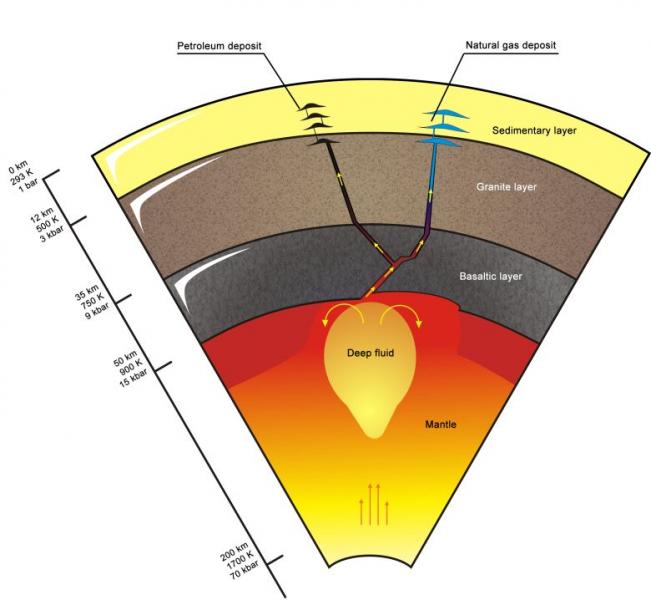Abiogenic Deep Origin of Hydrocarbons Disputes the Climate Change Cult (original) (raw)

Comments by Brian Shilhavy
Editor, Health Impact News
Today I am publishing a guest post by my Australian friend Dr. John Gideon Hartnett about the Abiogenic Deep Origin of Hydrocarbons.
I have briefly summarized this kind of research in the past (see: The Myth of “Fossil Fuels” and the Myth that the U.S. is Transitioning Away from Oil to “Green” Energy), but Dr. Hartnett is far more qualified to write on this topic than I am.
His bio:
Dr John Gideon Hartnett is an accomplished Australian physicist, cosmologist, and noted biblical creationist.
A PhD holder from The University of Western Australia (UWA), Hartnett has served at both UWA and the University of Adelaide, contributing to over 200 scientific papers.
He was a founding director of a successful startup that has commercialized his research on ultra-stable cryogenic ‘clocks’.
He’s known internationally as a speaker on biblical creation, and has written extensively on the subject, especially from an astrophysics and cosmology perspective.
Hartnett also writes popular science pieces, frequently critiquing man-made climate change and green energy.
He is also a fellow Truth Warrior and my brother in Christ, who stood firm against the tyrannical COVID edicts opposing the Australian Government from 2020 on, and standing on the Truth, even at risk to his own life and career.
Abiogenic Deep Origin of Hydrocarbons: Not Fossils But Primordial
The theory of abiogenic origin of petroleum and gas challenges the fossil fuel narrative, suggesting primordial formation. Experimental data supports this view.
Dr. John Gideon Hartnett
Bible Science Forum
The Climate Change cult constantly crows about how mankind must end the use of fossil fuels. But there is strong evidence that the oil and gas, which they call fossiliferous (formed from dead creatures allegedly millions of years ago), are in fact primordial.
This is the theory of abiogenic origin of hydrocarbons.
The above illustration is taken from the paper ‘Abiogenic Deep Origin of Hydrocarbons and Oil and Gas Deposits Formation’ by Vladimir G. Kutcherov published January 16, 2013.
The introduction from that paper states:
The theory of the abiogenic deep origin of hydrocarbons recognizes that the petroleum is a primordial material of deep origin [_Kutcherov, Krayushkin 2010_].
This theory explains that hydrocarbon compounds generate in the asthenosphere1 of the Earth and migrate through the deep faults into the crust of the Earth.
There they form oil and gas deposits in any kind of rock in any kind of the structural position (Fig. 1 above).
Thus the accumulation of oil and gas is considered as a part of the natural process of the Earth’s outgassing, which was in turn responsible for creation of its hydrosphere, atmosphere and biosphere.
Until recently the obstacles to accept the theory of the abyssal abiogenic origin of hydrocarbons was the lack of the reliable and reproducible experimental results confirming the possibility of the synthesis of complex hydrocarbon systems under the conditions of the asthenosphere of the Earth. [my emphases added]
The authors present a model for hydrocarbon formation from Calcium Carbonates, Iron Oxides and Water deep below the crust where the temperature and pressure are sufficiently high enough to achieve the reduction reaction necessary.
This theory has some similarity to the theory of the late Thomas Gold that oil is a primordial substance, continually manufactured by the Earth under ultra-hot conditions and tremendous pressures.
According to Gold, this substance, which he referred to as “deep hot biosphere,” is not of biological origin, but rather a primordial syrup that migrates towards the surface, where it is attacked by bacteria, giving the appearance of an organic origin dating back to the dinosaurs.
I do not believe the long ages (billions of years) assigned to the Earth. In fact, biblically the Earth is no more than 6000 years old. The dinosaurs died out primarily with the global deluge in Noah’s day.
The global flood laid down enormous deposits of sedimentary strata that nowadays are incorrectly interpreted as being millions of years old using the flawed uniformitarian assumption.
During the flood most of the living flora and fauna were buried under sediments which is evidenced by fossils of plants and animals (including dinosaurs) discovered in all layers.
In this regard we have a very good mechanism for the formation of coal, which is found even in the form of tree stumps with roots attached. So in that regard there is little doubt that coal is fossiliferous.
But what about petroleum and natural gas?
In some areas which experienced depleting oil wells it was discovered that the wells started to refill. In this regard a story by Chris Cooper appeared April 16, 1999, in The Wall Street Journal about an oil field called Eugene Island.
Here’s an excerpt:
Production at the oil field, deep in the Gulf of Mexico off the coast of Louisiana, was supposed to have declined years ago. And for a while, it behaved like any normal field: Following its 1973 discovery, Eugene Island 330’s output peaked at about 15,000 barrels a day. By 1989, production had slowed to about 4,000 barrels a day.
Then suddenly—some say almost inexplicably—Eugene Island’s fortunes reversed.
The field, operated by Pennz Energy Co., is now producing 13,000 barrels a day, and probable reserves have rocketed to more than 400 million barrels from 60 million.
Stranger still, scientists studying the field say the crude coming out of the pipe is of a geological age quite different from the oil that gushed 10 years ago.
Another piece of the puzzle was seen in the alkane distribution of petroleum from different oil fields.
Alkanes are organic compounds that consist entirely of single-bonded carbon and hydrogen atoms and lack any other functional groups. Alkanes have the general formula CnH2n+2 where n ≥1.
The relative amounts of these molecules in petroleum found in various locations are distinctly different suggesting non-fossiliferous origin.
Experiments were carried out in the lab to produce these alkanes from carbonates, iron oxides and water. The results were published by Kutcherov et al., 2002. The synthesis is described by the following reaction:
nCaCO3 + (9n+3)FeO + (2n+1)H2O → nCa(OH)2 + (3n+1)Fe3O4 + CnH2n+2
In various locations below the crust these inputs to the reaction could vary (i.e. different values for n in the equation above) resulting in different proportions of alkanes.
We can say that these experiments are consistent with the view that our Creator put in place a supply of hydrocarbon fuels for humanity to use for a very long time.
These hydrocarbons are a gift from God. Yet they are falsely attributed to have resulted from ‘evolution’ of the planet over billions of years.
It is by design, not by accident, that we have such an abundant supply and they are not fossil fuels.
Coal is another matter which defies explanation if you don’t acknowledge the Creator. Coal is a by-product of the global flood in Noah’s time, which covered the entire planet. Coal is found on every continent even Antarctica.
Coal contains carbon-14 a radioactive form of carbon with a half-life of about 5730 years.
Thus after a million years any carbon bearing mineral should have no carbon-14 left, because it would have all decayed away into the stable (non-radioactive) isotope nitrogen-14.
The problem is that ALL carbon bearing minerals on Earth, including coal, oil and natural gas, still contain measurable amounts of carbon-14.
If the evolutionary fairy tale of the planet were true that would not be the case.
See Earth’s Magnetic Field: A Shield by Design.
So no matter how much carbon dioxide the climate cult lunatics sequestrate into the Earth’s crust more of these hydrocarbons will bubble up from deep below adding to the available fuel for mankind.
Their feeble efforts are like trying to empty the ocean with a teaspoon. God will not be mocked!
Read the Full Article at Bible Science Forum
References
- The asthenosphere (from Ancient Greek ἀσθενός (asthenós) ‘without strength’) is the mechanically weak and ductile region of the upper mantle of Earth. It lies below the lithosphere, at a depth between ~80 and 200 km (50 and 120 mi) below the surface, and extends as deep as 700 km (430 mi).
Recommended Reading
- Book: Apocalypse Now: On the Revelation of Jesus Christ
- Book: Merchants of Death: Global Oligarchs and Their War On Humanity
Follow me
- Telegram.org: @GideonHartnett
- Facebook: Gideon Hartnett
- X (Twitter): @gideon195203
- My video channel on Bitchute.com
- My video channel on Rumble.com
- My video channel on Brighteon.com
- My video channel on YouTube.com
Science without Debate is Propaganda!

See Also:
Understand the Times We are Currently Living Through
American Christians Want a New Jewish King to Become Slaves Instead of Serving Jesus Christ in Freedom
Where is Your Citizenship Registered?
American Christians are Biblically Illiterate Not Understanding the Difference Between The Old Covenant vs. The New Covenant
Exposing the Christian Zionism Cult
Jesus Would be Labeled as “Antisemitic” Today Because He Attacked the Jews and Warned His Followers About Their Evil Ways
Insider Exposes Freemasonry as the World’s Oldest Secret Religion and the Luciferian Plans for The New World Order

Identifying the Luciferian Globalists Implementing the New World Order – Who are the “Jews”?
The Brain Myth: Your Intellect and Thoughts Originate in Your Heart, Not Your Brain
Fact Check: “Christianity” and the Christian Religion is NOT Found in the Bible – The Person Jesus Christ Is
Was the U.S. Constitution Written to Protect “We the People” or “We the Globalists”? Were the Founding Fathers Godly Men or Servants of Satan?
Published on May 18, 2024










